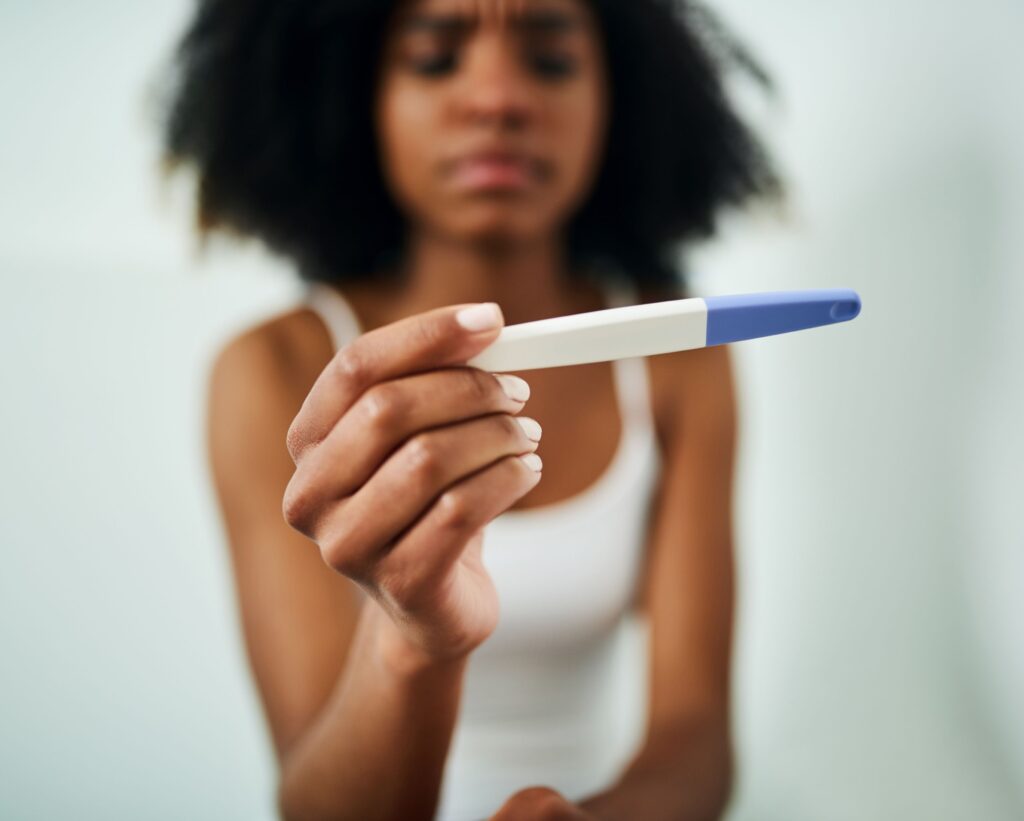You can have intercourse after a missed period whenever you want, as long as you take effective birth control measures. If you are counting days as a birth control method (i.e. Rhythm method or Calender method) and you still missed your period, you are probably already pregnant, because the rhythm method isn’t a reliable birth control measure. Take a pregnancy test to see whether you are pregnant or not.
You are most likely to become pregnant 14 days after the start of your previous period — this is when women often ovulate. It’s critical to keep in mind that this varies from woman to woman and even month to month. This variability is the reason why counting days (Rhythm method or Calendar-based method) is not a reliable birth control method. If you ovulated later than expected or became pregnant closer to your expected period than usual, the pregnancy hormones wouldn’t have risen enough to be detected by a pregnancy test kit if you took a test right around your missed period.
Recommended: Are Period Pants Good For Incontinence
Whether you’re sexually active or not, missing your period can be frightening. Missed or delayed periods can be caused by a variety of factors, and pinpointing the exact cause can take some time. However, there are several known causes of this problem, so at least you know where to start from. I will talk about the causes of missed periods and their remedies lady…
Missed Period After Unprotected Intercourse
Missed period after having unprotected intercourse could mean that you are pregnant. This is the most obvious outcome because the chances are very high. However, there could be other reasons why you missed your period which might not have anything to do with pregnancy.
Recommended: Can a Pregnancy Be Positive 8 Days After Intercourse?
It is paramount you first find out if you are pregnant by taking the pregnancy test 5 days or a week after missing your period using your first-morning urine. If it comes out negative, repeat the test after another 5 days or one week with your first-morning urine just like before. This is to give more time for the pregnancy hormone (hCG) level to rise well enough to be detected by the pregnancy test kit. If the result still comes out negative, it is then recommended you contact your Doctor/Gynecologist.
Common Causes Of Missed Period And Their Solutions
Pregnancy is the most common reason for missed periods. If you’re not sexually active, haven’t had sex in a few months, or your pregnancy test came back negative, you already know this isn’t the case.
Recommended:5 Basic Vaginal Discharge Types & What They Mean (Infographic)

With pregnancy out of the picture, it is time to look at other common possibilities that can cause missed or delayed periods. While one delayed or missed period isn’t a cause for concern, you shouldn’t allow it to continue. Here are the top six common reasons for irregular, delayed, or missed periods, as well as what you can do about them:
Excessive Exercise And Changes in Weight
While working out is beneficial, a sudden increase in activity or significant weight loss/weight gain can cause your menstrual cycle to be disrupted. This is common in young female athletes, as well as those who have poor nutrition and eating disorders such as Anorexia. Burning high calories causes hormonal imbalance, which can lead to this irregular or missed period.
The solution is to avoid extreme workouts and sudden weight gain or loss. Always keep tabs on your weight. If you have any underlying eating disorder, make sure to talk to your doctor about it. He will best advise you on how to handle your condition better.
Recommended: 7 Common Pregnancy Test Mistakes
Too Much Stress
You must have heard the saying that stress can put your body out of order, but this is especially true when it comes to your menstrual cycle. According to a study, ovulation and menstruation can be disrupted if you’re under a lot of stress.
The solution is stress reduction and self-care. This can easily be achieved by feeding well, exercising more, getting enough sleep/rest, practicing meditation, and engaging in fun activities.
Emergency Contraceptives And Changes in Birth Control
If you have recently started hormonal birth control, your menstrual cycle may become erratic for a short time. Also, changes in the menstrual cycle can be caused by the use of emergency contraceptives, according to a study. After using a contraceptive (e.g. Postinor), you will notice some alterations in your next period. It’s either is comes earlier than expected or it is delayed. You might also experience heavier flow or just spots. You might also miss your period entirely for that month. These changes aren’t a cause for concern, but if they persist, you should consult your doctor/gynecologist immediately.
Recommended: 10 Reasons Why You Have Smelling Private Part and Their Remedies
The solution is to be properly enlightened on any birth control method or contraceptive you are about to use, so you know what to expect and not be taken unawares.
Pelvic Inflammatory Diseases (PID)
Pelvic inflammatory disease is another disorder that can disrupt your menstrual cycle. When bacteria enter the vaginal and/or cervix, PID develops. It usually begins as a sexually transmitted infection, such as chlamydia or gonorrhea, with outward symptoms. Menstrual issues might occur if the infection spreads to the cells of the uterus.
It’s critical to see your doctor if you feel PID is the cause of your irregular menstrual period. PID, if left untreated can result in major consequences such as scarring of the fallopian tubes and infertility.
Recommended: Early STD Testing: Why Is it Necessary To Get Tested?
Thyroid Problems
Your thyroid gland is in charge of regulating your body’s metabolism and menstrual cycle, however, thyroid dysfunction can cause problems. Heavy periods, irregular periods, and missed periods can all be symptoms of thyroid problems. Thyroid disease is more common in women than in males, so if you have thyroid issues, let your doctor know.
The solution is to discuss with your doctor the best medications, and diet changes that can help resolve your thyroid issues. Eating healthy diets, practicing good sleep hygiene, and managing stress can help a lot.
Polycystic Ovary Syndrome (PCOS)
Polycystic ovary syndrome (PCOS) is a hormonal disorder common among women of reproductive age. PCOS can influence every aspect of your life, including your menstrual cycle. Weight gain, scalp hair thinning, and facial hair development are all common symptoms of PCOS, as are irregular, heavy, missed periods.
Recommended: Why Do Guys Like Eating Discharge?
It is best to speak with your doctor. he will examine you better and proffer a better solution. To help decrease the effects of PCOS, try to maintain a healthy weight. Weight loss can reduce insulin and androgen levels and may restore ovulation.
Conclusion
Can I have intercourse after missed period? The answer is YES. You can have intercourse after a missed period whenever you want, as long as you take effective birth control measures. It is ideal you take a pregnancy test after a missed period to see whether you are pregnant or not. Missed or delayed periods can be caused by a variety of factors, and pinpointing the exact cause can take some time.
When it comes to missed periods, one thing to keep in mind is that one or two irregular months aren’t unusual, but anything more than that warrants a visit to your doctor. The absence of periods, known as amenorrhea, can be caused by a variety of factors, which your doctor can be able to diagnose and treat.
